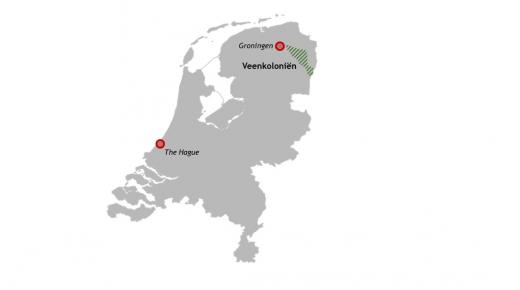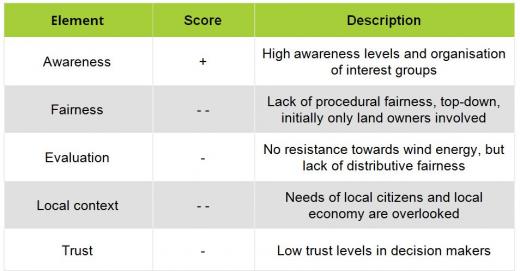Issues:
Sectors:
Keywords:
1. Social acceptance in technology deployment
1.1 Social acceptance is crucial for achieving climate targets
In its Roadmap for Moving to a Competitive Low Carbon Economy in 20501, the European Commission has outlined how the European Union (EU) can become a competitive low-emission economy by 2050, with possible actions leading to a reduction of greenhouse gas emissions of 80-95% by 2050, compared to 1990 levels. From the alternative scenarios described in the Roadmap it can be concluded that this widespread 'decarbonisation' is technically feasible. It is also indicated that economic benefits could possibly outweigh the costs, especially when new job opportunities in innovative industries and enhanced competitiveness in low emission growth are considered.
However, in addition to these technical and economic aspects, it is essential to include an analysis of the social aspects that influence the acceptance of clean technologies and measures, including renewable energy generation technologies2 3. Technologies that are technically and economically feasible in a given context may not be successfully implemented due to social resistance, lack of awareness of the technology, etc. Public opposition could then delay or obstruct the implementation of sustainable technologies and measures, such as renewable energy projects. This could hamper the attainment of environmental and societal goals, such as reducing greenhouse gas (GHG) emissions.
All electricity generating technologies comprise negative impacts to a certain extent. As renewable energy plants are being deployed in many locations, due to the ongoing decentralisation process, increasingly there are clashes with local communities4. Acceptance for this type of technologies, such as wind energy developments, can be low, as there are often strong perceived disadvantages. Arguments against wind energy include local externalities such as visual impact on the landscape, noise, shadow flicker, and impacts on the local ecosystem, as well as general arguments that wind energy is inefficient or too expensive. As low acceptance levels, as a result of these arguments, can seriously frustrate the development of renewables, it is vital to take this into account in the planning in order to decrease the probability of resistance.
1.2 ‘Acceptance’ as basis for support
'Acceptance' is a concept that involves a reaction to something which is proposed externally, whereby acceptance is ‘the act of accepting’ and thus ‘to give an affirmative reply to’ something. Social or public acceptance is generally defined2 5 6, as a positive attitude towards a technology or measure, which leads to supporting behaviour if needed or requested, and the counteracting of resistance by others. Acceptance that only covers an attitude without supportive behaviour may be described as 'tolerance'.
2. Elements of social acceptance
Considering that the success of climate-friendly technologies and measures largely depends on their social acceptance, it is important to have clear insight into the elements that influence public attitudes. In POLIMP’s 1st Policy Brief7, these elements have been categorised as follows:
- Awareness of climate change and knowledge of the technology (such as renewable energy);
- Fairness of the decision-making process;
- Overall evaluation of costs, risks and benefits of a technology;
- Local context;
- Trust in decision-makers and other relevant stakeholders.
2.1 Awareness
Social acceptance is influenced by both the awareness of climate change and its impacts, and the knowledge of the renewable energy technology in question. There is an evident positive relation between people’s awareness about climate change and its impacts, and their preparedness to act. Increased awareness generally increases the willingness to counteract climate change and the acceptance of climate-friendly technologies8 9 10.
Apart from awareness about climate change, it is important that the public is sufficiently familiar with the renewable energy generation technology. For new technologies, timely, complete and balanced knowledge needs to be provided in order to raise awareness on its costs, risks and benefits. Experience shows that potentially useful technologies will not be considered if the public is unfamiliar with them, so that many new and existing technologies are not commonly used11.
2.2 Fairness
The perceived fairness of the preparatory and decision-making processes influences how the public will evaluate a project. Procedures are considered to be fair when they are open and transparent, the public and stakeholders have a voice in decisions, and these inputs are given consideration by the decision makers12. Awareness-raising is important to give all stakeholders the opportunity to be involved in a fair process. Perceived fairness is generally higher if decision-makers are considered to be trustworthy. In turn, a fair and inclusive process leads to trust in decision-makers. In addition, several studies have found that joint ownership or community co-ownership of projects leads to higher social acceptance.3 9
Related to this element, the WISE Power project introduced five principles that should be respected to safeguard procedural justice, specifically in wind energy projects. These principles include openness (sharing all relevant information), inclusiveness (interacting with all stakeholders), responsiveness (listening to the community and stakeholder concerns), accountability (ongoing process of monitoring, evaluation and participation), and flexibility (preparing for local requests and being open to amendments).4
2.3 Assessment of costs, risks and benefits
Social acceptance of renewable energy will depend on the assessment of the costs, benefits and potential risks. This assessment is inherently subjective, as the public does not usually have complete knowledge or adequate information. The assessment made is therefore either a result of their level of awareness, or based on an assessment made by someone else, such as the project developer, the government, or an interest group.
While this overall evaluation of costs, risks and benefits assumes full rationality, in reality people are not expected to evaluate on a purely rational basis. The evaluation also depends on emotions, ethical questions and social needs. The overall evaluation of costs, risks and benefits should therefore be regarded in relation to specific fears or emotions (for example the local context), trust levels and other more subjective aspects.
2.4 Local context
While the public has a positive attitude towards renewable energy in general, individual projects regularly face resistance from the local community. People tend to resist change in their environment, out of a personal fear for a loss of quality of life13. Instead of disregarding local views as NIMBY behaviour, both rational and emotional parts of the local debate should be taken seriously. Both rational objections to projects and specific fears and emotions should be identified, discussed and dealt with14.
Since a disproportionate share of negative impacts of a development, such as a wind energy park, is for the local community, a strategy for sharing benefits may be employed. This can either be financial compensation, local (co-)ownership or benefits in kind (direct local improvements).4
2.5 Trust: a cross-cutting issue
Public trust in decision-makers and other stakeholders influences the acceptance of renewable energy. Public trust in stakeholders depends on the perception of their organisational competence and integrity. The element of trust can be considered as a crosscutting issue, as it influences the other four elements discussed above, and is in turn also influenced by them.
3. Case study: wind energy in the Netherlands
Case studies of renewable energy projects show how social acceptance levels influence the success of the projects. The 1st POLIMP Policy Brief and related Background Paper show case studies of district heating in England and Wales, waste-to-energy plants in Greece, a tidal stream generator in Northern Ireland and wind farms in the Netherlands. Below the latter case study is summarised.
The construction of several wind farms is being planned in the Veenkoloniën area of Groningen and Drenthe provinces, the Netherlands for the Period 2015-2020. As part of the national government’s ambition to have a capacity of 6000 MW of on-shore wind power by the year 2020, wind farms with a total capacity of around 700 MW will be installed. The planning and preparation of the project is carried out in a top-down manner by the Ministry of Economic Affairs. Direct agreements are made with local land owners, mostly farmers, on the placement of the wind turbines, and this led to a notification of intent in 2012.
The local population was informed in principle on the spatial designs of the wind farms, but citizens’ needs, local initiatives, stakeholder interests and other local economic functions were overlooked in the planning. As a result, the local population has no direct revenues or benefits from the wind farms and are merely faced with negative effects related to “visibility, noise and the intermittent shade of the wind turbines”. Because initially only land owners were involved in the planning process, resistance to the plans evolved from the wider local community during public hearings.
A survey by De Boer and Zuidema14 shows that the local population does not resist wind energy per se, but "they found it unfair that such an unequal share of the (…) wind power capacity was designated for installation in their region." In other words, a low level of distributive fairness was being perceived by the public. This was reinforced by long-standing feelings of local residents that their region is being disadvantaged. The trust level in the national government was therefore already low.
The table below provides an example of a table that could help to evaluate the social acceptance elements of a renewable energy project.
4. Improving social acceptance
The importance of taking the social side of renewable energy projects into account is widely recognised. Considering that the success of projects depends to a large extent on their social acceptance, it is important to have clear insight into what would be the social implications of deploying and diffusing these renewable energy technologies. Social acceptance should thus be considered and addressed at two levels:
- Project planning and development: social acceptance needs to be taken into account by the developers of the clean technology project, as well as related local and regional government policy makers. Involvement of the local community in planning and development, or even (co-)ownership, may lead to higher social acceptance;
- Higher policy-making level: for example at the EU and member states, policymakers have to consider social acceptance as one of the determining factors in the predictability of clean technology investments. Social acceptance levels may be influenced through for example information and transparency rules, campaigns and support mechanisms.


